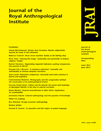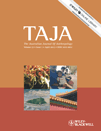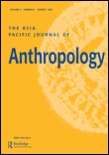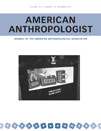
JOURNAL OF THE ROYAL ANTHROPOLOGICAL INSTITUTE
Scope & Guideline
Exploring the Depths of Human Culture
Introduction
Aims and Scopes
- Cultural Anthropology:
Research focused on understanding cultural practices, beliefs, and social structures within different societies, emphasizing ethnographic methods to uncover nuanced local perspectives. - Political Economy:
Exploration of economic systems, power dynamics, and their impact on social relations, often addressing themes of inequality, globalization, and development. - Environmental Anthropology:
Investigation of human-environment interactions, including the impacts of climate change, sustainability practices, and indigenous ecological knowledge. - Gender and Sexuality Studies:
Critical analysis of gender roles, identities, and sexualities in various cultural contexts, highlighting issues of power, agency, and resistance. - Migration and Mobility:
Studies focusing on the implications of migration, displacement, and transnationalism, looking at how these movements shape identities and social structures. - Indigenous Studies:
Research that centers on indigenous peoples' perspectives, rights, and cultural heritage, often challenging colonial narratives and advocating for social justice. - Methodological Innovation:
Encouragement of new methodological approaches in anthropology, including digital ethnography, participatory research, and interdisciplinary collaborations.
Trending and Emerging
- Digital Anthropology:
An increasing number of studies focus on the intersection of technology and culture, exploring how digital platforms influence social interactions, identity formation, and cultural practices. - Climate Change and Environmental Justice:
Research addressing the social implications of climate change, environmental degradation, and ecological justice has gained prominence, reflecting the urgent need for anthropological perspectives on these global challenges. - Social Movements and Activism:
There is a rising interest in documenting and analyzing grassroots movements, resistance strategies, and the role of anthropology in social change, emphasizing the discipline's relevance in contemporary political contexts. - Health and Well-being:
Emerging studies that examine health systems, mental health, and social determinants of health illustrate a growing focus on the anthropological implications of health and wellness in various cultural settings. - Urban Anthropology:
An increased emphasis on urban contexts and the complexities of urban life, including migration, social networks, and cultural diversity, reflects a trend towards exploring anthropological issues in metropolitan settings. - Transnational Studies:
Research that investigates the dynamics of transnationalism, diasporas, and cross-border interactions highlights the fluidity of cultural identities and social relations in a globalized world.
Declining or Waning
- Traditional Anthropological Theory:
There has been a notable decrease in papers strictly adhering to classical anthropological theories, such as structuralism or functionalism, in favor of more contemporary and critical frameworks. - Colonial Studies:
Although colonialism remains an important topic, the frequency of papers solely focused on colonial histories and impacts has diminished, with a shift towards discussions of postcolonialism and contemporary implications. - Forensic Anthropology:
Research in forensic anthropology appears to be declining, perhaps reflecting a broader trend in anthropology moving away from specialized forensic applications towards more holistic cultural and social examinations. - Archaeological Anthropology:
Studies specifically centered on archaeological methods and findings seem less prevalent, suggesting a potential shift towards living cultures and contemporary social issues rather than historical artifacts. - Ethnobotany:
Papers examining traditional plant use and knowledge have become less common, indicating a possible waning interest in this niche area within the broader field of anthropology.
Similar Journals

Focaal-Journal of Global and Historical Anthropology
Uncovering the Global Narratives of Our PastFocaal-Journal of Global and Historical Anthropology is an esteemed academic journal published by BERGHAHN JOURNALS, focusing on the intricacies of global and historical anthropology. With an impressive impact factor and positioned in the Q1 category of anthropology for 2023, this journal is recognized for its exceptional contributions to the field, ranking #121 out of 502 in the Social Sciences category on Scopus. Since its transition to Open Access in 2020, Focaal has made significant strides in democratizing academic knowledge, allowing broader accessibility for researchers, professionals, and students worldwide. The journal provides a platform for interdisciplinary dialogue and critical analysis, paving the way for innovative research and thought-provoking discussions. With a commitment to fostering a deeper understanding of anthropological practices and their global implications, Focaal is an essential resource for anyone engaged in contemporary anthropological studies.

Australian Journal of Anthropology
Advancing the Frontiers of AnthropologyThe Australian Journal of Anthropology, published by Wiley, stands as a pivotal resource in the field of anthropology, reflecting a deep commitment to advancing scholarly discourse since its inception in 1990. With an ISSN of 1035-8811 and E-ISSN 1757-6547, this journal provides a platform for innovative research and critical analysis, contributing to the global anthropology community. Based in the United States, at 111 River St, Hoboken, NJ, it has established itself in the Q3 category of anthropology journals, ranking #162 out of 502 in Scopus, placing it in the 67th percentile among its peers. While it is not currently an open-access publication, the journal remains dedicated to accessibility through institutional subscriptions and provides a wealth of insight into anthropological methods and cultural studies. It seeks to foster interdisciplinary dialogue and promote a comprehensive understanding of social dynamics, making it an essential read for researchers, professionals, and students eager to enrich their knowledge and engage with contemporary anthropological issues.

Boletin Antropologico
Exploring the Rich Tapestry of Latin American CulturesBoletin Antropologico, published by UNIV LOS ANDES, is a vital academic journal dedicated to the field of anthropology, focusing on the diverse cultural practices, social structures, and historical contexts of societies, particularly within Latin America. With its ISSN of 0257-750X, this journal aims to provide a platform for researchers and scholars to disseminate their findings and engage in meaningful discussions that advance the understanding of anthropological issues. Although Boletin Antropologico currently does not follow an open-access model, it remains a significant resource for professionals seeking peer-reviewed content that reflects rigorous academic standards. With a commitment to fostering intellectual growth and collaboration among anthropologists, the journal serves as an essential reference for students and practitioners keen on exploring the rich tapestry of human cultures and societies.

Cuadernos de Antropologia
Advancing Anthropological Knowledge for AllCuadernos de Antropología is a premier academic journal published by the University of Costa Rica, Faculty of Social Sciences, that has been contributing to the field of anthropology since 1983. With its commitment to Open Access, this journal ensures that research findings are readily available to a global audience, fostering collaboration and knowledge dissemination across various regions and disciplines. Although specific metrics like H-index or Scopus Rankings are not provided, the journal's long-standing history and accessibility underscore its importance in promoting anthropological research in Latin America and beyond. Covering a broad spectrum of topics within anthropology, Cuadernos de Antropología welcomes submissions from researchers, professionals, and students, aiming to enrich the academic landscape with diverse perspectives and innovative insights. Located in the heart of Costa Rica, the journal serves as a vital platform for advancing the understanding of cultural, social, and historical contexts that shape human behavior.

DIALECTICAL ANTHROPOLOGY
Championing Innovative Perspectives in AnthropologyDIALECTICAL ANTHROPOLOGY, published by SPRINGER, is a prestigious journal within the field of anthropology, recognized for its substantial contributions to dialectical and critical theory in social research. Since its inception in 1975, the journal has carved a niche by exploring the intersections of culture, society, and politics, making it an essential resource for scholars and practitioners. With an impact factor that places it in the Q2 category for both anthropology and arts and humanities, and significant rankings in sociology and political science, it reflects a solid scholarly reputation. The journal operates on a subscription basis, allowing for a wide dissemination of rigorous academic research without open access. With ISSN 0304-4092 and E-ISSN 1573-0786, DIALECTICAL ANTHROPOLOGY serves as a crucial platform for fostering dialogue and advancing knowledge in contemporary anthropology and related disciplines. As a researcher, professional, or student, engaging with the insights presented in this journal will deepen your understanding of the dynamic interplay between structural and agency-oriented perspectives in social contexts.

Annual Review of Anthropology
Synthesizing Ideas Across Social SciencesAnnual Review of Anthropology is a premier journal published by Annual Reviews, dedicated to providing comprehensive and authoritative reviews in the field of anthropology. Established with the goal of synthesizing essential research findings, this influential publication not only shapes contemporary anthropological discourse but also facilitates interdisciplinary dialogue within the broader realm of social sciences and cultural studies. With an impressive impact factor that places it in the Q1 category across multiple classifications, including Anthropology and Arts and Humanities, this journal is highly regarded by researchers and academics alike. The Annual Review of Anthropology has been a trusted resource for critical insights and transformative ideas, helping to advance the understanding of human societies from 1980 to the present. Although it does not offer open access, access to its articles is available through various academic institutions, ensuring that both seasoned scholars and students can benefit from its wealth of knowledge. With a Scopus ranking placing it in the top percentiles for relevant subjects, this journal is essential reading for anyone looking to stay at the forefront of anthropological research.

Asia Pacific Journal of Anthropology
Navigating the Depths of Cultural DiversityAsia Pacific Journal of Anthropology is a premier academic journal dedicated to advancing the field of anthropology and cultural studies, published by Routledge Journals, Taylor & Francis Ltd. With an ISSN of 1444-2213 and E-ISSN 1740-9314, this journal has gained recognition for its rigorous scholarly contributions since its inception in 2000. Situated in the UK, it is strategically positioned to serve as a vital resource for researchers, professionals, and students exploring the rich complexities of human societies and cultures within the Asia Pacific region and beyond. As evidenced by its Q2 ranking in both anthropology and cultural studies for 2023, alongside its impressive Scopus ranks—#218 among 1304 in Cultural Studies and #157 among 502 in Anthropology—this journal illustrates a strong commitment to delivering high-quality, impactful research. While it is not an open-access journal, it remains a key platform for disseminating innovative research and fostering academic dialogue, thereby significantly contributing to the advancement of knowledge in the social sciences.

AMERICAN ANTHROPOLOGIST
Shaping the future of anthropology with impactful scholarship.American Anthropologist is a prestigious journal published by Wiley, dedicated to advancing the field of anthropology. With a rich publishing history dating back to 1888, it has become a leading platform for scholarly discourse, showcasing innovative research and diverse perspectives from around the globe. The journal holds impressive ranks within its categories, being recognized as Q1 in both Anthropology and Arts and Humanities, alongside a notable Scopus ranking of #36 out of 502 in Social Sciences. Its robust impact in academia is reflected in its emphasis on interdisciplinary approaches that resonate within the fields of social science and humanities. Researchers and students alike are encouraged to contribute to this vital resource that continues to shape anthropological thought and practice. For those interested, the journal is tailored for non-open access, ensuring the curation of high-caliber scholarly work accessible to a wide audience while supporting the standards of peer-reviewed publications.

ANTHROPOLOGICAL QUARTERLY
Shaping the Future of Anthropological DiscourseANTHROPOLOGICAL QUARTERLY, published by the George Washington University Institute of Ethnographic Research, stands as a vital resource in the field of anthropology and broader arts and humanities studies. With an ISSN of 0003-5491 and an E-ISSN of 1534-1518, this esteemed journal has been contributing to academic discourse since its establishment in 1981. The journal holds a respected position in both the Q2 category for Anthropology and the Q2 category for Arts and Humanities (miscellaneous), demonstrating its impact and relevance, as evidenced by its rank of #152 out of 502 in the Social Sciences sector for anthropology and rank of #179 out of 552 in the Arts and Humanities field. Researchers, professionals, and students can rely on ANTHROPOLOGICAL QUARTERLY for rigorous peer-reviewed articles that push the boundaries of ethnographic research and anthropological theory, addressing contemporary issues with scholarly precision. The journal’s commitment to fostering critical analysis and interdisciplinary perspectives establishes it as an essential platform for advancing knowledge within its diverse and dynamic field.

Chungara-Revista de Antropologia Chilena
Exploring the Depths of Chilean CultureChungara-Revista de Antropologia Chilena is a premier academic journal dedicated to the field of anthropology, showcasing research and discourse that emphasize the rich cultural heritage of Chile and its surrounding regions. Published by UNIV TARAPACA, this journal serves as a vital platform for scholars, researchers, and students keen on exploring anthropological studies, ethnographic fieldwork, and cultural analysis. With an ISSN of 0717-7356, it adheres to rigorous academic standards and strives to promote open dialogue on contemporary and historical issues across various communities. Although currently not indexed in prominent metrics, its commitment to scholarly excellence contributes significantly to the academic landscape, fostering a deeper understanding of anthropological practices in Chile and beyond. Authors are encouraged to engage with the journal's rich repository of knowledge while readers gain access to pivotal insights that drive forward the discourse within anthropology.